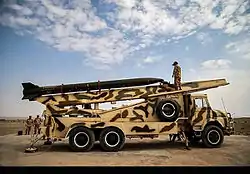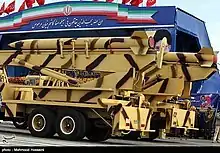Naze'at
The Naze'at 6-H and Naze'at 10-H/Mushak-120/Iran-130[2] (Persian: نازعات) are two Iranian long-range artillery rockets with ranges of about 100 km. The Naze'at 10-H is larger, more powerful, and has a longer range than the Nazeat 6-H. Like Iran's similar shaped Zelzal rockets, Naze'at rockets do not have a guidance system. Both systems are also widely known without the -H suffix, as the Naze'at 6 and Naze'at 10. The Iranians also have developed another 500 kg version called the Mushak-160 with 160 km range.[2]
| Naze'at | |
|---|---|
 | |
| Type | Artillery rocket |
| Service history | |
| Used by | Iran |
| Production history | |
| Manufacturer | Iran |
| Variants | Naze'at 4[1] Naze'at 5[1] Naze'at 6 Naze'at 10 |
| Specifications | |
| Engine | Solid |
Operational range | 100–130 km |
Launch platform | Transporter erector launcher |
History
The Naze'at family was developed during the 1980s with Chinese assistance in an attempt to build an equivalent of the FROG-7 missile.[3]
Specifications

- Naze'at 6-H rocket
- Max. range (km): 100
- Min. range (km): 80
- Length (mm): 6290
- Diameter (mm): 356
- Initial weight (kg): 960
- Warhead weight (kg): 130
- C.E.P (%): <5% Max. range
- Average Action Time (s): 9
- Specific Impulse (s): 240
- Propellant Weight (kg): 420
- Type of Propellant: Solid (HTPB)
- Service life: 7 years [4]
- Naze'at 10-H rocket
Details
The Naze'at is launched from a transporter erector launcher (TEL) and carries a conventional warhead, and potentially a chemical or biological one.[6] A complete Naze'at system includes a TEL and communications vans, meteorological vans, and a GPS system for surveying the launch site.[6] Both Naze'at rockets have a closing velocity of mach 4-5.[6] The reliability and accuracy of Naze'at rockets is assessed as poor.[6]
The Naze'at has fins for stabilization in flight and is believed to have a CEP of around 500-1000 m, which is considered poor.[3] There are multiple different TELs used for Naze'at rockets.[3]
See also
- Zelzal-1
- Zelzal-2
- Zelzal-3
- Iran's missile forces
- Iranian military industry
- Current Equipment of the Iranian Army
References
- "Iranian Artillery Rockets". Federation of American Scientists. Archived from the original on 10 March 2016.
- "Fateh-110/NP-110/Mushak". GlobalSecurity. Archived from the original on 1 January 2019.
- Galen Wright (March 15th 2011) Iranian Military Capability 2011 - Ground Forces
- http://www.modlex.ir/cgi-bin/store.pl/page=product.html/pid=MXF05-000330
- http://www.modlex.ir/cgi-bin/store.pl/page=product.html/pid=MXF05-000340
- Anthony H. Cordesman, Arleigh A. Burke Chair in Strategy (July 14, 2006) Lebanese Security and the Hezbollah. Working Draft.